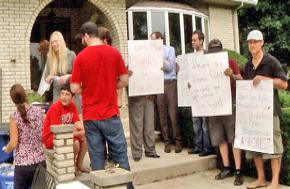The banks prefer empty homes
provides a firsthand account of a recent action to protest a family's eviction in Addison, Ill.
LUZ SMEDBRON--a disabled mother of three and an American citizen originally from Ecuador--along with about a dozen housing rights advocates, stood together on Smedbons' porch in Addison, Ill., on July 29. With protest signs in hand, they chanted, "The people united, will never be defeated!"
As DuPage County sheriffs moved in, protesters stood their ground. As news cameras arrived on the scene, the officers slunk back to their patrol cars, looking confused and embarrassed. They radioed for reinforcements.
"The banks did not work with me, they would not give me a reasonable modification. They prefer to have houses empty and people homeless," said Luz Smedbron.
Wells Fargo, the bank Luz had been paying $3,000 a month to for the last five years, has demanded proof of $6,000 in monthly income to even consider modifying Luz's loan. Her disability checks fell well short of the modification requirements.
The Federal Reserve recently fined Wells Fargo $85 million--for illegally targeting African American and Latino families for subprime loans. Both minority groups had lost more than 55 percent of their net worth by 2009 as a result of the 2008 economic crisis, according to a recent Pew Research Center report.

According to CNN, "The Fed accused the nation's fourth largest bank by assets [Wells Fargo] of steering potential borrowers who could have qualified for prime rates into more expensive sub prime loans."
The bank was also charged with forging loan documents.
The recent fine was an unprecedented move by the Fed, which has looked the other way in the past when addressing the racism and injustice of subprime lending.
Although large relative to fines issued by the Federal Reserve, $85 million is a drop in the ocean in comparison to Fargo's annual revenue of $20 billion. Warren Buffett, the "billionaire with a heart," said, "Wells has come closer to doing [it] right than any other big bank by some margin." Buffett is the bank's largest shareholder.
AFTER SMEDBRON exhausted two years attempting to modify her loan with Wells Fargo, the bank sold the home to a bottom-feeding real-estate speculator. Patrick Young, president of Financial Advantage Mortgage, arrived alongside of sheriff deputies in a black, military-style Hummer, to ensure the eviction was carried through.
"There is no real freedom in this country if you don't have money," said Luz Smedron's 12-year-old son, Max. He continued, "I'd call my friends over to help us [protest the eviction], but they're all at football practice."
After huddling for two hours, and with reinforcements in place, the DuPage County sheriffs donned black gloves and descended on the family and activists.
Holly Krig, Christopher Poulos, Toussaint Losier, Jorge Ortiz and myself were arrested. Jorge Ortiz was kneed in the spleen and slammed to the ground during the arrest.
Each of us was charged with one count of criminal trespass to property, one count of obstructing a "peace" officer and one count of obstructing service of process, all misdemeanors. Ortiz and Poulos were also charged with resisting a "peace" officer, also a misdemeanor.
We all face up to $2,000 in fines and a maximum of one year in prison.
About 15 of Smedbron's neighbors looked on as we were arrested. A few of the neighbors defended the family's right to stay in the home; others encouraged the arresting officers.
Before the action, the family, with activists, walked door-to-door asking neighbors to stand in solidarity with the family. Some agreed--notably, the ones who were facing eviction themselves--and held protest signs in the street.
Others refused to stand with the family, despite the effect the Smedbrons' eviction would have on their own home values. The speculator paid a fraction of the original cost of the mortgage and drove the rest of the neighborhoods real-estate values down with the purchase. No one other than the bank and speculator stood to gain from this eviction.
One neighbor said, "if they don't pay their bills, they belong in the streets." Another said, "I'll stay on the sidelines for this one." They seemed unmoved by Luz's disability and her soon-to-be homeless children.
Activists spent 10 hours in the DuPage County jail. All of us were treated with disrespect by the jailers. Officials refused to answer any questions regarding the nature of the actual charges or how long we would be locked in the bright, florescent-lit, white, cinder-block boxes.
When Luz was asked what would happen next, after the protesters were arrested, she said, "I have no place to go now. We'll probably end up in a shelter."
The Daily Herald reported, "Smedbron and her youngest son, Max, walked the street in front of their home Friday afternoon after the arrests, while police and movers occupied the house."
Homeowners are facing similar dire situations around the country, and we'll need to step up out activism if we're going to stop these evictions.


